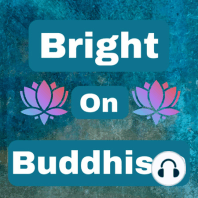30 min listen
What is Buddhist psychology?
ratings:
Length:
22 minutes
Released:
Sep 23, 2022
Format:
Podcast episode
Description
Bright on Buddhism Episode 40 - What is Buddhist psychology? What are its doctrinal foundations? What is its influence in the West?
Resources: Caroline Brazier: A Buddhist Perspective On Mental Health. Paper for Nurturing Heart and Spirit: A National Multi-Faith Symposium; Held under the auspices of the Nimhe Spirituality Project, Staffordshire University and The Spirituality and Mental Health Forum, Wednesday November 1st 2006; Davidson, Richard J. & Anne Harrington (eds.) (2002). Visions of Compassion: Western Scientists and Tibetan Buddhists Examine Human Nature. NY: Oxford University Press. ISBN 0-19-513043-X.; Dockett, K. H., Dudley-Grant, G. R., & Bankart, C. P. (2003). Psychology and Buddhism: From individual to global community: Springer Science & Business Media.; Epstein, Mark (2004), Thoughts Without A Thinker: Psychotherapy from a Buddhist Perspective, Basic Books, Kindle Edition; Fromm, Erich, D. T. Suzuki & Richard De Martino (1960). Zen Buddhism and Psychoanalysis. NY: Harper & Row. ISBN 0-06-090175-6.; Fromm, Erich (1989, 2002). The Art of Being. NY: Continuum. ISBN 0-8264-0673-4.; Goleman, Daniel (ed.) (1997). Healing Emotions: Conversations With the Dalai Lama on Mindfulness, Emotions, and Health. Boston: Shambhala Publications. ISBN 1-57062-212-4.; Goleman, Daniel (2004). Destructive Emotions: A Scientific Dialogue with the Dalai Lama. NY: Bantam Dell. ISBN 0-553-38105-9.; Virtbauer, Gerald (March 2012). "The Western reception of Buddhism as a psychological and ethical system: developments, dialogues, and perspectives". Mental Health, Religion & Culture. 15 (3): 251–263. doi:10.1080/13674676.2011.569928. S2CID 145760146.; Virtbauer, Gerald (1 April 2014). "Characteristics of Buddhist Psychology". SFU Forschungsbulletin: 1–9. doi:10.15135/2014.2.1.1-9.; Wallace, B. A., & Shapiro, S. L. (2006). Mental balance and well-being: building bridges between Buddhism and Western psychology. American psychologist, 61(7), 690.; Watts, Alan W. (1959). The Way of Zen. NY: New American Library. Cited in Ellis (1991).; Watts, Alan W. (1960). Nature, Man and Sex. NY: New American Library. Cited in Ellis (1991).; Watts, Alan W. (1961, 1975). Psychotherapy East and West. NY: Random House. ISBN 0-394-71610-8.; Bodhi, Bhikkhu (ed.) (2000). A Comprehensive Manual of Abhidhamma: The Abhidhammattha Sangaha of Ācariya Anuruddha. Seattle, WA: BPS Pariyatti Editions. ISBN 1-928706-02-9. - also online: http://www.accesstoinsight.org/lib/authors/bodhi/abhiman.html; Brazier, David (2001), The Feeling Buddha, Robinson Publishing; Curtis, C. (2016). The Experience of Self/No-Self in Aikido. Journal of Consciousness Studies, 23(1-2), 58–68.; Flanagan, Owen (2011-08-12). The Bodhisattva's Brain: Buddhism Naturalized. MIT Press. p. 107. ISBN 978-0-262-29723-3.; Rick Hanson: Buddha's Brain: The Practical Neuroscience of Happiness, Love, and Wisdom. New Harbinger Publications (2009); Stephen Batchelor: After Buddhism: Rethinking the Dharma for a Secular Age. Yale University Press (2017)
Do you have a question about Buddhism that you'd like us to discuss? Let us know by finding us on email or social media! https://linktr.ee/brightonbuddhism
Credits:
Nick Bright: Script, Cover Art, Music, Voice of Hearer, Co-Host
Proven Paradox: Editing, mixing and mastering, social media, Voice of Hermit, Co-Host
---
Send in a voice message: https://podcasters.spotify.com/pod/show/brightonbuddhism/message
Resources: Caroline Brazier: A Buddhist Perspective On Mental Health. Paper for Nurturing Heart and Spirit: A National Multi-Faith Symposium; Held under the auspices of the Nimhe Spirituality Project, Staffordshire University and The Spirituality and Mental Health Forum, Wednesday November 1st 2006; Davidson, Richard J. & Anne Harrington (eds.) (2002). Visions of Compassion: Western Scientists and Tibetan Buddhists Examine Human Nature. NY: Oxford University Press. ISBN 0-19-513043-X.; Dockett, K. H., Dudley-Grant, G. R., & Bankart, C. P. (2003). Psychology and Buddhism: From individual to global community: Springer Science & Business Media.; Epstein, Mark (2004), Thoughts Without A Thinker: Psychotherapy from a Buddhist Perspective, Basic Books, Kindle Edition; Fromm, Erich, D. T. Suzuki & Richard De Martino (1960). Zen Buddhism and Psychoanalysis. NY: Harper & Row. ISBN 0-06-090175-6.; Fromm, Erich (1989, 2002). The Art of Being. NY: Continuum. ISBN 0-8264-0673-4.; Goleman, Daniel (ed.) (1997). Healing Emotions: Conversations With the Dalai Lama on Mindfulness, Emotions, and Health. Boston: Shambhala Publications. ISBN 1-57062-212-4.; Goleman, Daniel (2004). Destructive Emotions: A Scientific Dialogue with the Dalai Lama. NY: Bantam Dell. ISBN 0-553-38105-9.; Virtbauer, Gerald (March 2012). "The Western reception of Buddhism as a psychological and ethical system: developments, dialogues, and perspectives". Mental Health, Religion & Culture. 15 (3): 251–263. doi:10.1080/13674676.2011.569928. S2CID 145760146.; Virtbauer, Gerald (1 April 2014). "Characteristics of Buddhist Psychology". SFU Forschungsbulletin: 1–9. doi:10.15135/2014.2.1.1-9.; Wallace, B. A., & Shapiro, S. L. (2006). Mental balance and well-being: building bridges between Buddhism and Western psychology. American psychologist, 61(7), 690.; Watts, Alan W. (1959). The Way of Zen. NY: New American Library. Cited in Ellis (1991).; Watts, Alan W. (1960). Nature, Man and Sex. NY: New American Library. Cited in Ellis (1991).; Watts, Alan W. (1961, 1975). Psychotherapy East and West. NY: Random House. ISBN 0-394-71610-8.; Bodhi, Bhikkhu (ed.) (2000). A Comprehensive Manual of Abhidhamma: The Abhidhammattha Sangaha of Ācariya Anuruddha. Seattle, WA: BPS Pariyatti Editions. ISBN 1-928706-02-9. - also online: http://www.accesstoinsight.org/lib/authors/bodhi/abhiman.html; Brazier, David (2001), The Feeling Buddha, Robinson Publishing; Curtis, C. (2016). The Experience of Self/No-Self in Aikido. Journal of Consciousness Studies, 23(1-2), 58–68.; Flanagan, Owen (2011-08-12). The Bodhisattva's Brain: Buddhism Naturalized. MIT Press. p. 107. ISBN 978-0-262-29723-3.; Rick Hanson: Buddha's Brain: The Practical Neuroscience of Happiness, Love, and Wisdom. New Harbinger Publications (2009); Stephen Batchelor: After Buddhism: Rethinking the Dharma for a Secular Age. Yale University Press (2017)
Do you have a question about Buddhism that you'd like us to discuss? Let us know by finding us on email or social media! https://linktr.ee/brightonbuddhism
Credits:
Nick Bright: Script, Cover Art, Music, Voice of Hearer, Co-Host
Proven Paradox: Editing, mixing and mastering, social media, Voice of Hermit, Co-Host
---
Send in a voice message: https://podcasters.spotify.com/pod/show/brightonbuddhism/message
Released:
Sep 23, 2022
Format:
Podcast episode
Titles in the series (100)
What is Zen Buddhism? by Bright On Buddhism
